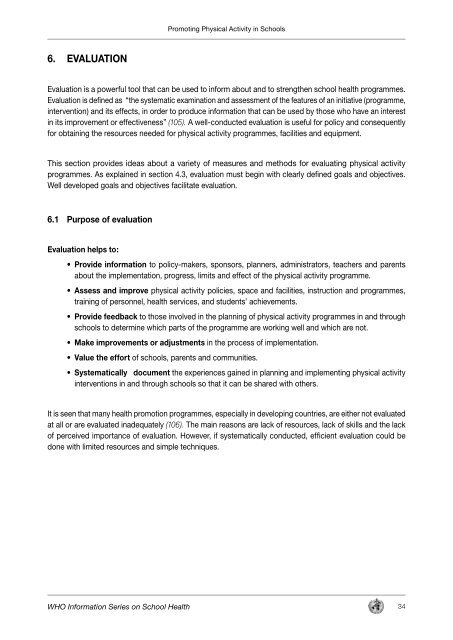WHO INFORMATION SERIES ON SCHOOL HEALTH ... - PAHO/WHO
WHO INFORMATION SERIES ON SCHOOL HEALTH ... - PAHO/WHO
WHO INFORMATION SERIES ON SCHOOL HEALTH ... - PAHO/WHO
Create successful ePaper yourself
Turn your PDF publications into a flip-book with our unique Google optimized e-Paper software.
6. EVALUATI<strong>ON</strong><br />
Promoting Physical Activity in Schools<br />
Evaluation is a powerful tool that can be used to inform about and to strengthen school health programmes.<br />
Evaluation is defined as “the systematic examination and assessment of the features of an initiative (programme,<br />
intervention) and its effects, in order to produce information that can be used by those who have an interest<br />
in its improvement or effectiveness” (105). A well-conducted evaluation is useful for policy and consequently<br />
for obtaining the resources needed for physical activity programmes, facilities and equipment.<br />
This section provides ideas about a variety of measures and methods for evaluating physical activity<br />
programmes. As explained in section 4.3, evaluation must begin with clearly defined goals and objectives.<br />
Well developed goals and objectives facilitate evaluation.<br />
6.1 Purpose of evaluation<br />
Evaluation helps to:<br />
• Provide information to policy-makers, sponsors, planners, administrators, teachers and parents<br />
about the implementation, progress, limits and effect of the physical activity programme.<br />
• Assess and improve physical activity policies, space and facilities, instruction and programmes,<br />
training of personnel, health services, and students’ achievements.<br />
• Provide feedback to those involved in the planning of physical activity programmes in and through<br />
schools to determine which parts of the programme are working well and which are not.<br />
• Make improvements or adjustments in the process of implementation.<br />
• Value the effort of schools, parents and communities.<br />
• Systematically document the experiences gained in planning and implementing physical activity<br />
interventions in and through schools so that it can be shared with others.<br />
It is seen that many health promotion programmes, especially in developing countries, are either not evaluated<br />
at all or are evaluated inadequately (106). The main reasons are lack of resources, lack of skills and the lack<br />
of perceived importance of evaluation. However, if systematically conducted, efficient evaluation could be<br />
done with limited resources and simple techniques.<br />
<strong>WHO</strong> Information Series on School Health 34

















